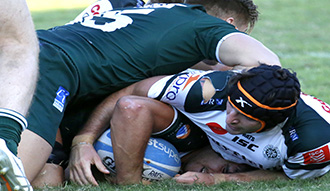Concussion and Repetitive Head Trauma Research Group
Concussion and Repetitive Head Trauma Research Group
MQ Health and Macquarie University perform leading research into concussion and repetitive head trauma
Our research team is studying the in-life characteristics and experiences of patients with repeated head trauma, linked with a neuropathology brain donation research program. The major goal of this early work is to understand the risk of chronic traumatic encephalopathy (CTE) and other types of dementia according to repeated head trauma exposure.
Macquarie University and its academic health sciences centre, MQ Health, is home to leading expertise in concussion and CTE. Our multidisciplinary team brings together this research and clinical expertise to study the effects of concussion and repeated head trauma on quality of life in the short term as well as the longer term risks and effects and what can be done to minimise them.
In particular, our group is interested in determining whether multiple concussions and exposure to repeated subconcussive impacts (those without symptoms) can cause difficulties with cognitive functioning, mood stability, behavioural changes, and eventually lead to CTE. We aim to develop more sensitive diagnostic testing to detect CTE earlier in life and to prevent or reduce the effects of repeated head trauma.
Our team includes experts in neurology and dementia, neuropsychology, neuro-ophthalmology, ageing, wellbeing, mental health, cognitive sciences and other areas.
We also collaborate closely with the Centre for Ageing, Cognition, and Wellbeing.
About concussion and CTE
Concussion is when a head or neck injury such as direct impact, twisting, whiplash or blast force leads to symptoms and suspected brain changes. Concussion is commonly seen on the sporting field, as well as in workplace injuries, with an increase in recent community awareness of the potential issues after concussion and the need to manage concussion closely.
Although concussion is considered a milder form of head injury, the symptoms can be significant – such as headache, light sensitivity, mental fatigue, sleep disturbance, dizziness and difficulties with thinking and concentration – and can stop an individual participating fully in life, work, and sport for a period.
Usually these symptoms clear up with adequate medical oversight and physical and cognitive-graded rest, but some patients can experience prolonged symptoms lasting weeks or months after concussion, which is termed post-concussion syndrome.
Repeated concussions can lead to even longer recovery, and there is increasing evidence and concern that repeated head trauma can lead to CTE in the long term. This condition was first discovered in boxers in the 1920s. It has been researched mainly in American football athletes but has been shown to occur in a wide range of contact or collision situations, such as through sport collisions or in other ways such as repeated falls, assault, some work environments, or blast injury.
To find out more about our clinical services for patients who have suffered a concussion or have concerns about potential impacts of repeated concussions or other heat traumas, please see our MQ Health Concussion Clinic page and the relevant Conditions and Treatments page.
What is CTE?
CTE (chronic traumatic encephalopathy) has been identified across all codes of football, and the rate in Australia is unknown. CTE is thought to potentially occur in not only contact sports but circumstances outside sport such as falls, blast trauma, building and construction, or domestic violence. CTE is a type of progressive dementia, leading to memory loss, impaired thinking ability, irritability, low mood, or anger.
MQ Health Concussion Service and the Concussion and Repetitive Head Trauma research group are assisting in ways to reduce concussion and the long term neurological effects of head trauma. We aim to promote brain health across the lifespan and to assist in monitoring those concerned about cognitive or psychological changes after head injury.
Concussion Connect support group
MQ Health and Macquarie University Hospital offer patient with repeated concussion a support service, involving specialist and expert support. Concussion is a common condition, and many in the community are worried about what this means for their long term wellbeing. The support group provides a safe forum for the discussion of symptoms related to concussion, including those with suspected CTE. If you wish to join Concussion Connect, please contact MQ Health Neurology on (02) 9812 3720 or neurology@mqhealth.org.au


